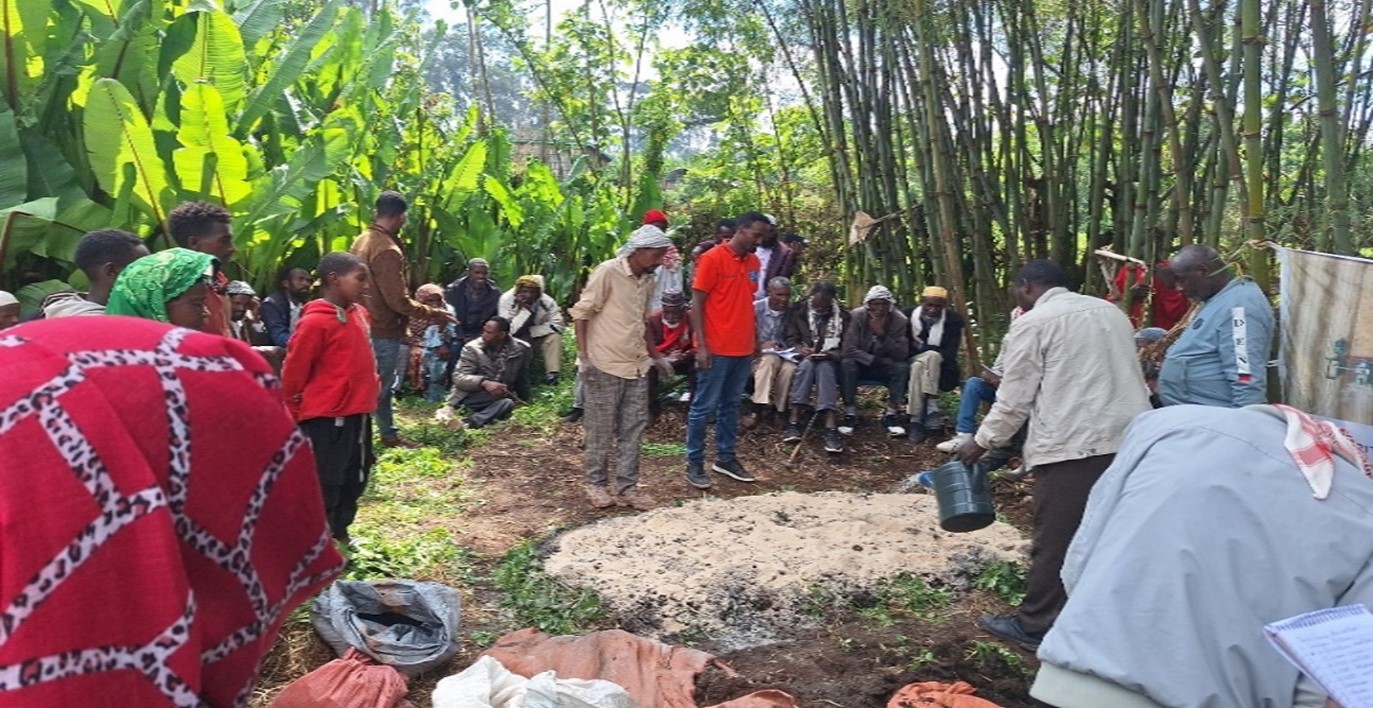Reducing agrochemical dependency through organic practices
05-09-2024Written by Dita Beshada, Junior Cooperative Advisor Ethiopia
Organic fertilisers are naturally produced materials that can be added to soil or plants to provide essential nutrients and support growth. Unlike inorganic (synthetic) fertilisers, which are derived from synthetic materials, organic fertilisers are sourced from naturally occurring biochemical processes. Common examples include animal waste (such as manure and slurry) and plant-based fertilisers like compost.
The recent global increase in agrochemical prices, exacerbated by the conflict in Ukraine, has underscored the value of organic compost and liquid biofertilisers. Proper management of these organic fertilisers is crucial to maximize benefits and prevent nutrient loss. Organic compost and liquid biofertilisers offer a sustainable alternative to chemical fertilisers, as they can be produced locally at minimal cost, ensuring availability and reducing dependency on imported chemicals. Unlike chemical fertilisers, which provide a short-term nutritional boost but deplete soil nutrients over time, organic compost and biofertilisers nourish and regenerate the soil, enhancing its fertility with successive applications.
Chemical fertilisers often require personal protective equipment (PPE) due to health risks from unsafe handling. In contrast, organic fertilisers, being natural products, general do not necessitate PPE, enhancing safety and reducing associated costs.
Modern agricultural practices, including the heavy use of synthetic fertilisers and pesticides, have disrupted nutrient cycling and microbial activity in the soil. This disruption has led to soil degradation, decreased crop yields, increased vulnerability to pests and diseases, and reduced water retention capacity. Soil degradation is a significant issue in Ethiopia, particularly in the Kofele district.
Agriterra Acting Now Project
The Agriterra Acting Now Project aims to enhance food system resilience by supporting targeted producers and farmers’ organisations in the West Arsi of the Oromia Region. During cooperative assessments and field visits to farmers’ organisations under the Agriterra Acting Now Project, it was observed that while soil fertility is generally good, there has been a notable decline due to nutrient depletion and mismanagement. The accessibility of fertilisers has become increasingly challenging due to supply shortages and rising prices, significantly impacting farmers’ productivity.
To address these challenges, the project proposes organising training sessions on agroecology in farming, focusing on organic compost preparation, liquid biofertiliser, and ash solution preparation. These sessions would be conducted for selected lead farmers and extension officers at Bitacha and Gurmicho Multipurpose Primary Cooperatives in the Kofele district. The primary objective of the training was to introduce cooperative lead farmers to agroecology principles, expanding their knowledge and skills in organic farming practices.

Theoretical training at the venue
Practical training on organic compost and liquid biofertiliser preparation
The training sessions included a practical component focused on the preparation of organic compost and liquid biofertiliser. Participants learned how agroecology principles can maintain a healthy balance between crop production and the environment, improve soil health, and reduce dependency on agrochemicals.

Practical training on the preparation of organic compost.

Practical training on liquid biofertiliser; participants are being instructed on the preparation of organic liquid biofertiliser
During the training, participants acquired valuable skills in compost preparation and bioliquid fertiliser production. Properly composted organic materials can significantly enhance soil fertility, while bioliquid fertilisers, after a month of fermentation, provide essential minerals and compounds that protect plants from insects and pathogens. By adopting these organic practices, farmers began to break their dependency on agrochemicals, achieving a more resilient and productive farming system.

During the Agriterra Acting Now Project, the Junior Cooperative Advisor would professionally examine or check the expected prepared compost.
Mr. Yasin Alaka, a young lead farmer and member of Bitacha Multipurpose Primary Cooperative said: ’’Thank you for the training organised through the Agriterra Acting Now project! I have learned a lot on how to prepare and apply these prepared products from locally available materials on my farmland. I produced 4.5 tons of organic compost and 500 liters of liquid biofertiliser and used it on 0.75 hectare of head cabbage and other vegetables like lettuce and carrots, reducing chemical dependency by 40% this season.’’
The results
Agriterra Acting Now’s comprehensive support to the farmers of Gurmicho and Bitacha Multipurpose Primary Cooperatives have yielded remarkable valuable insights.
- Many farmers acquired valuable skills in organic compost preparation and liquid biofertiliser production
- Farmers’ interest in the benefits of organic practices has significantly increased
- Some farmers have begun reducing their reliance on agrochemicals
- Many farmers have recognised the superior effectiveness of organic practices over agrochemicals, both theoretically and practically
